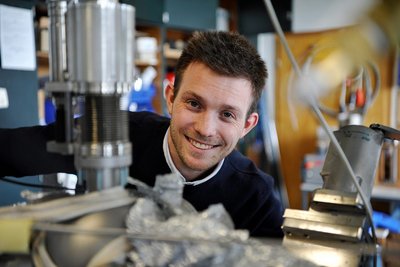Recognition for young researchers from Clausthal
Clausthal doctoral student Viktor Udachin, who is involved in the Collaborative Research Center (CRC) "Oxygen-Free Production", has been invited to the 73rd Lindau Nobel Laureate Meeting.
Mankind needs oxygen to live. "In production technology, however, oxygen is a problem because oxidation makes it difficult to process metals," explains Viktor Udachin. The doctoral student at the Institute of Energy Research and Physical Technologies and the Clausthal Center for Materials Technology at Clausthal University of Technology is one of around 50 researchers in the CRC 1368 "Oxygen-free production". As part of the joint Collaborative Research Center with Leibniz Universität Hannover, methods and approaches for reducing the oxygen content within production processes in the metalworking industry are being investigated.
The Collaborative Research Center is now in its second funding phase, which runs until 2028. Viktor Udachin, who has been a research assistant in Prof. Wolfgang Maus-Friedrichs' working group for five years, is conducting research in the deoxidation technology sub-project. The aim is to deoxidize the surfaces of materials such as iron, steel and copper before the manufacturing process. This means removing oxygen from them, for example using a non-thermal plasma. "The first funding phase has shown that it works, the approach is successful," reports the young researcher: in an oxygen-free environment, significantly improved component properties can be achieved as a result of new processes and products. For example, thermal conductivity, adhesive tensile strength and reaction layer wear can be greatly optimized. In addition, oxygen-free production leads to greater energy and resource efficiency,CO2 savings and protection of the environment - in short, greater sustainability.
Reflects the TU's high level of expertise in materials technology
"As Clausthal University of Technology, we are proud that our young scientist Viktor Udachin has been selected to take part in this year's Nobel Laureate Meeting. His highly innovative research is an excellent reflection of our university's enormous expertise in the field of materials technology and confirms our research strategy," says Dr. Sylvia Schattauer, President of Clausthal University of Technology.
The second funding phase of the CRC is now underway with the aim of using the developed methodology and testing it in industry, for example in high-frequency welding for the production of steel pipes. "That's what motivates me to do research: To develop something in the laboratory that will subsequently benefit society and the environment," says Viktor Udachin, who also uses the research infrastructure of the Clausthal Center for Materials Technology for this purpose. Seven years ago, he came to the Harz Mountains for a research internship lasting several months as part of a cooperation between the Ural Federal University in Yekaterinburg and Clausthal University of Technology. He then completed his master's degree in inorganic chemistry in the Ural city and moved to Clausthal University of Technology as a doctoral student in 2019. He is also hoping for further motivation and inspiration from the 73rd Lindau Nobel Laureate Meeting, to which he was invited following a selection process.
A week with 30 Nobel Laureates
The meeting, which this year takes place on Lake Constance from June 30 to July 5, has brought together around 30 Nobel Laureates and almost 600 highly qualified young researchers (students, doctoral candidates and postdocs) from up to 90 countries for a week every year since 1951. This year, the focus is on physics. The aim is the intercultural and intergenerational exchange of knowledge and experience as well as the development of networks. The invitation for Viktor Udachin, who lives in Goslar and is married, is also a tribute to the entire training of young scientists at Clausthal University of Technology.
